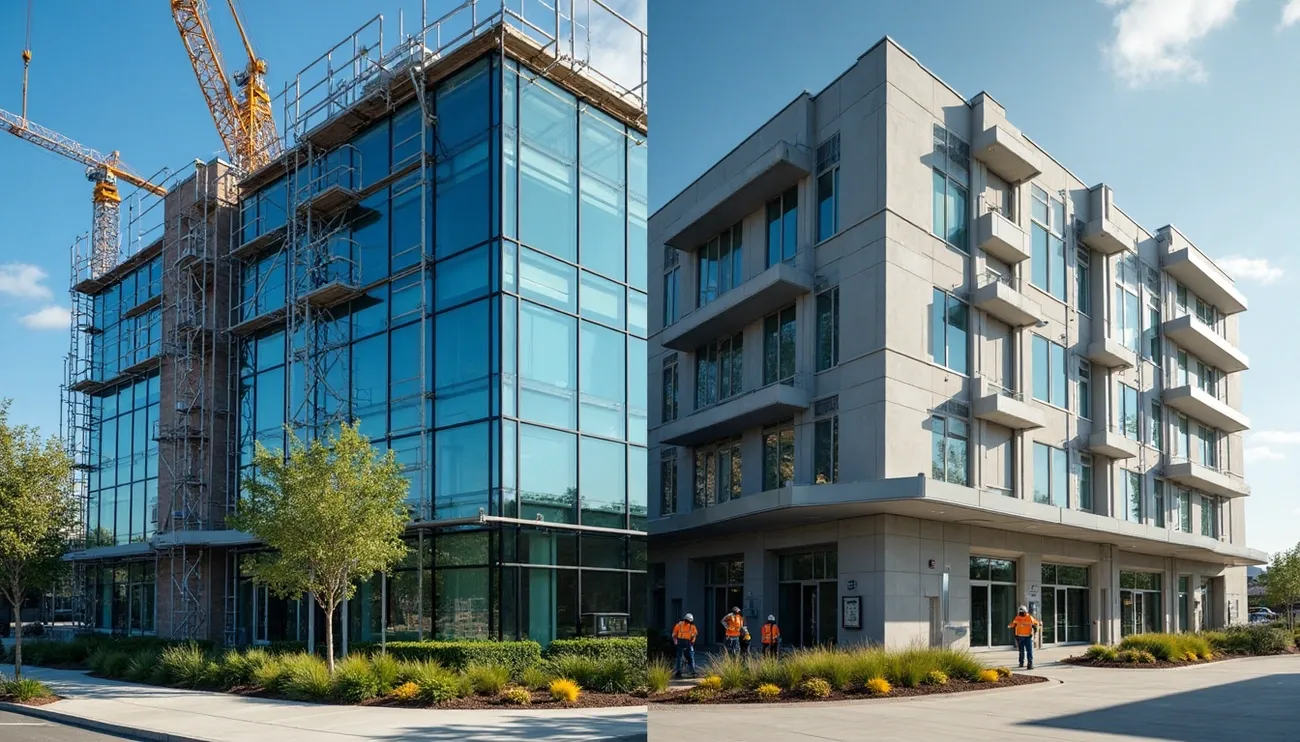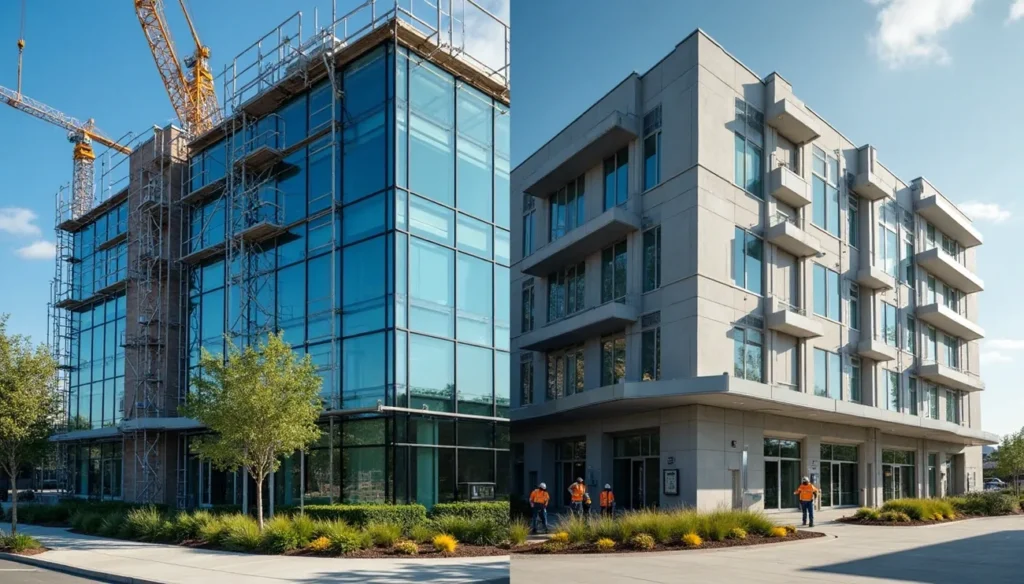What’s the Real Difference Between Capital and Operating Expenses in Real Estate?
 Capital capital expenses vs operating expenses mix-ups can drain thousands from real estate investors through needless tax payments and money mistakes. Both play vital roles in property ownership, and knowing their differences is significant to make smarter financial choices in commercial real estate.
Capital capital expenses vs operating expenses mix-ups can drain thousands from real estate investors through needless tax payments and money mistakes. Both play vital roles in property ownership, and knowing their differences is significant to make smarter financial choices in commercial real estate.
Real estate capital expenses add value to your property through major purchases that last many years, like building renovations or structural improvements. Your operating expenses cover day-to-day costs such as utilities and property management fees that keep your property running. This difference goes beyond simple accounting terms—it carries most important tax implications. You must depreciate capital expenses over time, while operating expenses qualify for immediate deductions. These factors shape your bottom line in different ways.
Commercial real estate investors often misclassify operating expenses and capital expenditures. New investors struggle with this concept the most. The way you categorize a capital expense versus an operating expense shapes your property’s value and yearly tax burden. This piece explains what sets these expense types apart and why becoming skilled at this knowledge drives your success in real estate investing.
Understanding Capital Expenses Vs Operating Expenses in Real Estate
The difference between capital expenses vs operating expenses in real estate forms the foundations of smart financial decisions. These expense types affect your tax strategy, property valuation, and investment returns in different ways.
What is a capital expense in real estate?
Capital expenses (CapEx) are major investments that boost a property’s value or extend how long it lasts. These big, one-time purchases deliver benefits beyond a single year. Real estate investors count roof repairs or replacements, new HVAC systems, major renovations, structural improvements, and property upgrades that boost value as capital expenditures.
Capital expenses show up on the balance sheet as assets, not as immediate expenses. These investments get capitalized and depreciated over the asset’s useful life instead of being deducted in just one tax year.
What is an operating expense in real estate?
Operating expenses (OpEx) cover the daily costs to keep a property running smoothly. These regular expenses maintain the property without improving it. Property management fees, taxes, insurance premiums, routine repairs, utilities, landscaping, legal fees, and administrative costs are common examples.
Operating expenses can be fully deducted in the same year. They appear right on the income statement. The property’s Net Operating Income (NOI) comes from subtracting these expenses from rental income. NOI serves as a key metric to evaluate real estate performance.
Why the difference matters for investors and owners
Your tax situation changes based on how you classify these expenses. You can deduct operating expenses right away in the current tax year. Capital expenditures need depreciation over several years – usually 27.5 years for residential properties.
These expenses also change your cash flow in different ways. OpEx represents regular, ongoing costs that need monthly budgeting. CapEx happens less often but costs more when it does.
Proper expense classification leads to accurate financial reports. Wrong classifications can throw off NOI calculations and affect property values and investment choices. Most property owners try to keep their operating expenses between 35% to 45% of their rental income.
How These Expenses Are Treated in Accounting
The accounting treatment of capital expenses vs operating expenses shows key differences in how these costs affect financial statements. Accounting principles demand separate handling of these expenses that affects tax liability and property valuation.
Capital expenses on the balance sheet
Real estate investors add capital expenditures to the balance sheet as a fixed asset instead of expensing them immediately. To cite an instance, see a commercial HVAC system replacement – the cost appears as a line item on the income statement while the fixed asset value gets recorded on the balance sheet. This approach reflects the property improvements’ long-term value. These capital expenditures raise the property’s basis, which matters during future sale calculations.
Operating expenses on the income statement
Operating expenses take a simpler accounting route. These costs maintain the property rather than improve it and get recognized fully in their accounting period. Property taxes serve as a good example of operational expenses that cover one year. The income statement shows these expenses under “operating expenses” and they reduce the property’s operating income. Real estate investors usually deduct these expenses right away to maximize their current-year tax benefits.
Depreciation vs. immediate deduction
The biggest difference in accounting lies in when tax benefits occur. Operating expenses give immediate tax deductions in the year they happen. Capital expenditures need capitalization and depreciation over the asset’s useful life. Residential rental properties have a depreciation period of 27.5 years, while commercial properties need 39 years. A $12,000 roof replacement on a residential property yields $436 in annual tax deductions ($12,000 ÷ 27.5) instead of an immediate $12,000 deduction.
IRS guidelines state that expenses “to betterment or restoration or adaptation to a new or different use” must be recovered through depreciation. Capital expenditures don’t allow direct tax deductions but help reduce taxes through depreciation over time.
Key Differences Between Capital and Operating Expenses
Capital expenses vs operating expenses have several key practical differences beyond their accounting treatments. Property owners need to understand these differences to get better returns and optimize their tax strategies.
Timeframe of benefit: long-term vs. short-term
The biggest difference between these expense types comes down to how long their benefits last. Capital expenditures deliver value over multiple years—often decades. Operating expenses provide benefits that usually last only 12 months. This timing difference shapes how investors plan their budgets and manage properties.
Major renovations and system upgrades count as capital improvements that invest in a property’s future. These expenses often add significant value to the property itself. We focused on maintaining current functionality through operating expenses that give immediate but short-term benefits.
Impact on cash flow and profitability
Each expense category affects financial metrics differently. Operating expenses directly lower Net Operating Income (NOI), which serves as a crucial valuation metric for commercial properties. Capital expenditures don’t affect NOI right away but reduce immediate cash flow because they cost more upfront.
Operating expenses offer immediate tax deductions that boost current-year profits. Capital expenditures spread through depreciation give smaller yearly tax benefits over longer periods. The depreciation creates a tax shield that gradually lowers taxable income instead of all at once.
Examples of CapEx vs. OpEx in commercial properties
These differences become clear when looking at commercial property expenses:
- Capital Expenses:
- Major renovations (facade replacements, adding new facilities)
- HVAC or roof replacement
- Parking lot repaving
- Elevator modernization
- Building expansions or structural improvements
- Operating Expenses:
- Property taxes and insurance
- Routine maintenance and minor repairs
- Utilities (electricity, water, internet)
- Property management fees
- Regular cleaning services
Investors who understand these differences can make better decisions about repairs versus replacements and structure their investments for the best financial results.
Strategic Implications for Real Estate Owners and Investors
The way you manage capital expenses vs operating expenses can make or break your real estate investment success. Smart investors know how to use these expense types to optimize their finances and grow their investments over time.
Budgeting and forecasting considerations
Property managers need different budgeting approaches for each expense type. You should set up a dedicated reserve fund for capital expenditures. Start by listing your “big-ticket” items and divide their replacement costs by expected lifespan. A $45,000 parking lot with a 15-year lifespan needs about $3,000 in annual reserves. This strategy helps you avoid cash flow problems when major systems break down.
Your operating expenses need tracking through an Operating Expense Ratio (OER). Calculate this by dividing total operating expenses by gross operating income. A healthy OER should stay below 40%. This number shows how well you manage expenses and maintain cash flow. Regular expense checks help you spot problems early and boost your financial results.
Tax planning and deduction strategies
The difference between these expense types opens up several tax planning options:
- Operating expenses cut your taxable income right away
- Capital expenses give you tax benefits through depreciation deductions over time
- Smart timing of repairs versus replacements can help you pay less tax each year
Properties with positive cash flow but negative taxable income can help lower your effective tax rate. Cost segregation studies can move 20-30% of property value to shorter depreciation schedules (5, 7, and 15 years). This change could boost first-year depreciation from $18,181 to $42,565 on a $500,000 property.
How CapEx and OpEx affect property valuation
Properties needing lots of capital expenditures usually sell for less than similar properties with lower CapEx needs. Better management of operating expenses improves Net Operating Income (NOI) and raises property value. Smart capital improvements can make your property more attractive to renters. This leads to higher rents and fewer empty units.
The most successful investors include both expense types in their complete financial planning. They balance immediate tax benefits with long-term value growth.
Conclusion
The basic difference between capital expenses and operating expenses is the life-blood of successful real estate investing. This piece explains how these two expense categories differ in accounting treatment, tax implications, and how they affect your finances. Capital expenditures build long-term value through property improvements. Operating expenses keep day-to-day operations running.
Misclassifying these expenses can have serious financial effects. Operating expenses give you immediate tax deductions. Capital expenses must be depreciated over many years—27.5 years for residential properties and 39 years for commercial ones. This difference shapes everything from your current tax liability to your property’s value.
Smart real estate investors know that managing both expense types strategically creates opportunities to optimize finances. You can maximize cash flow and long-term returns by keeping appropriate reserves for future capital expenditures and managing operating costs well.
The proper classification helps calculate critical metrics like Net Operating Income that directly affects property valuation. You should develop a complete understanding of your property’s expense profile, especially when you have potential investments to evaluate.
Success in real estate ended up depending on these financial basics. The difference between capital and operating expenses helps you make better decisions, optimize tax benefits, and build more wealth through real estate investing. Of course, the time you spend understanding these concepts pays off through better financial outcomes and investment performance.





